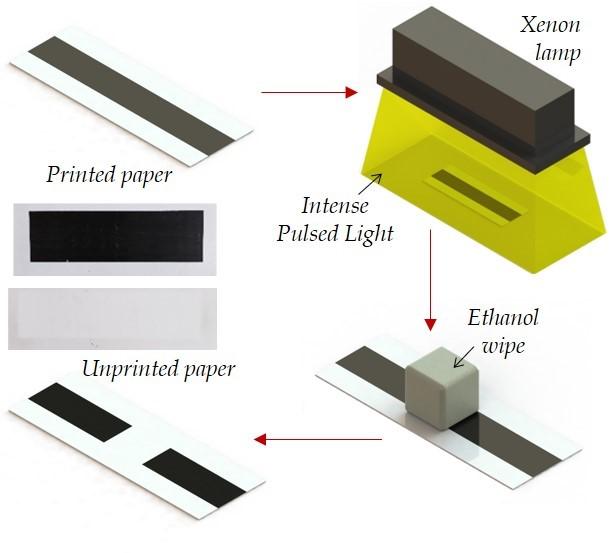New unprinting method can help recycle paper and curb environmental costs

A new way to unprint paper using intense pulsed light from a xenon lamp. Credit: Rajiv Malhotra/Rutgers University-New Brunswick
Imagine if your printer had an “unprint” button that used pulses of light to remove toner, curbing environmental impacts compared with conventional paper recycling.
A Rutgers-led team has created a new way to unprint paper that, unlike laser-based methods, can work with the standard, coated paper used in home and office printers.
The new method uses pulses of light from a xenon lamp, and can erase black, blue, red and green toners without damaging the paper, according to a study in the Journal of Cleaner Production.
“Our method makes it possible to unprint and then reprint on the same paper at least five times, which is typically as many times paper can be reused with conventional recycling. By eliminating the steps involved in conventional recycling, our unprinting method could reduce energy costs, pollution and greenhouse gas emissions,” said study coauthor Rajiv Malhotra, an assistant professor in the Department of Mechanical and Aerospace Engineering in the School of Engineering at Rutgers University-New Brunswick.
Conventional recycling of coated paper is a major contributor to climate change emissions, chemical pollution and energy use, according to the study. Extending the life of paper while avoiding these recycling steps would yield significant environmental benefits.
The engineers' next steps are to further refine the method by testing additional toner colors on a wider range of paper types. Unprinting can be done with simple equipment and a wipe with a very small amount of benign alcohol, and the engineers are working to integrate unprinting with typical office and home printers.
###
The study's lead author is Michael Dexter, a former Rutgers engineering doctoral student. Former undergraduate engineering student Keri Rickman contributed to the study, along with researchers at Oregon State University.
Media Contact
All latest news from the category: Studies and Analyses
innovations-report maintains a wealth of in-depth studies and analyses from a variety of subject areas including business and finance, medicine and pharmacology, ecology and the environment, energy, communications and media, transportation, work, family and leisure.
Newest articles

Decoding Cancer: 40 Years of Breakthroughs in Genetic Research
Cancer in children and adolescents is rare. Nevertheless, malignant diseases are still one of the most common causes of death in this age group. Survivors of childhood or adolescent cancer…

Let’s Think Before the First Drink: How Early Substance Use Might Lead to Brain Structure Differences Among Adolescents
Many differences appeared to exist prior to any substance use, pointing to the role brain structure may play in substance use risk, NIH-supported study suggests. Studies reveal factors that expose…

Combating Kidney Cancer Using Enhanced Immunotherapies
Medical University of South Carolina Hollings Cancer Center researcher receives Department of Defense Early Career Scholar Award to improve immune therapies by targeting resistant kidney tumors. A Medical University of…



